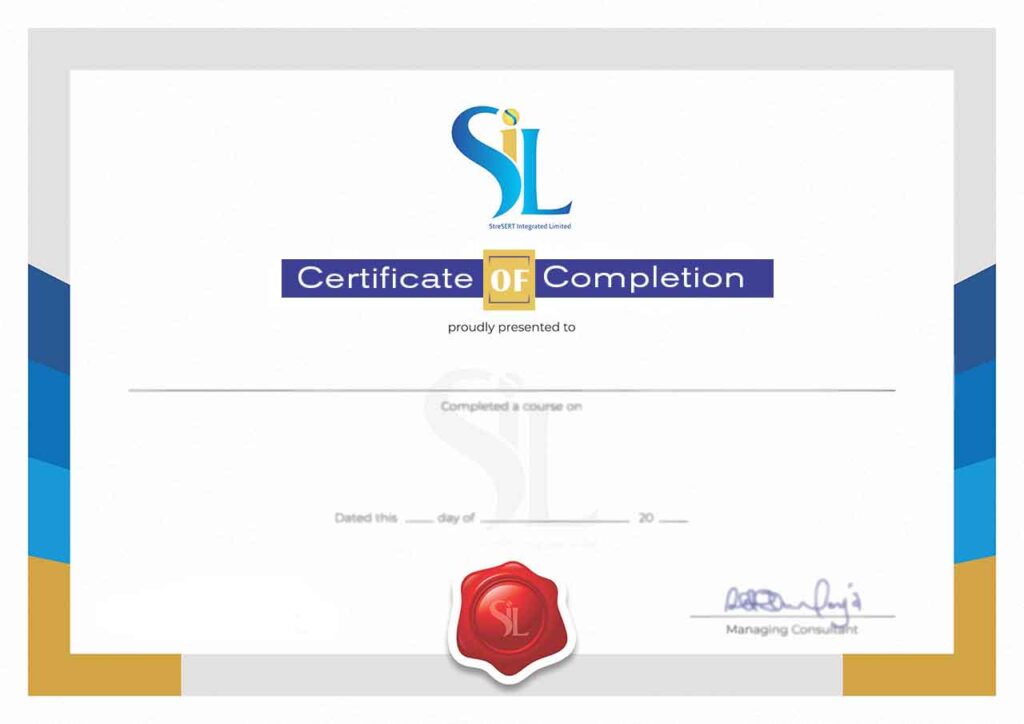CONFLICT RESOLUTION AND CRISIS MANAGEMENT
Instructor: Industry Expert-Led
Group enrollment is available for Teams. Learn more
Professional Course
Certificate Ready
Our comprehensive Certificate-Ready Course is designed to equip you with the knowledge, expertise, and credentials you need to excel in your field
Virtual & Physical Classroom
Virtual and Physical Classes. Whether you prefer the convenience of studying from the comfort of your home or the interactive experience of an in-person classroom, we have you covered.
+234 806 788 0956
Do you have any questions about the course? Talk to our Expert now
What you'll learn
Crisis Management training course offers Participants the basics in identifying, preventing, and controlling crisis situations, and helps understanding the importance and challenges faced when addressing Crisis Management, which is vital for the safety and security of human life, revenues and reputation.
During this training course, Crisis Management activities from preparation to training and compliance are covered, various stages of a crisis are discussed, Crisis Management functional structure, roles & responsibilities and procedures are also discussed. This training course emphasizes the importance of communication and making instant and effective decisions at the different stages of the Crisis: the pre-crisis, during the crisis and post-crisis, including the assessment and identification of the most common weaknesses found to adjust and improve.
This training course will highlight
- Your natural personality preferences for thinking, feeling, speaking, and behaving that may trigger conflict – or help to manage it
- The default conflict-management strategies people use – both helpful and unhelpful
- The nature, types and causes of conflict and difficulty – interpersonal and strategic.
- Highly effective strategic and verbal techniques to address conflict and difficulties at both the individual and organizational level.
- How to structure your meetings, presentations, and communications to reduce negative conflict and encourage healthy debate
Objectives
At the end of this training, you will learn to:
- Identify the common types and sources of conflict in your workplace.
- Learn about your personality and that of others to be able to learn how to engage people to avoid conflicts.
- Understand the predictable emotional triggers and responses to conflict.
- Differentiate between assertive, passive, and aggressive behaviours.
- Deal with difficult people and situations using a large range of powerful techniques.
Skills you'll gain
Training Methodology
This training course will utilize a variety of learning techniques to ensure maximum understanding, comprehension, retention of the information presented.
Organisational Impact
The organization’s benefit for this course include:
- Having a high-trust culture of openness, integrity, and certainty
- Stronger working relationships, greater collaboration, and discretionary effort
- Improved ability of employees to resolve their own problems and difficulties so avoiding extended disruptions
- Lowered workplace stress and tension thereby resulting in improved morale
- Constructive resolution of conflicts and challenges
- Higher levels of organizational productivity
Personal Impact
After the training, delegates will be able to:
- Recognize the early signs of conflict and resolve it
- Resolve issues quickly and effectively
- Increase the overall productivity of team or department
- Create time for more important strategic and operational matters
- Gain credible recognition in the eyes of senior management
Who Should Attend?
This training is suitable:
- Managers
- Team leaders
- Supervisors
- Human Resource Staff/Manager
Course Details
DAY 1:
The Power of Emotional Intelligence in Conflict Situations:
- Understanding the role of emotional intelligence in conflict resolution
- Managing and regulating emotions during conflicts
- Developing empathy and understanding for others’ perspectives
Team Dynamics:
- Exploring the dynamics of teamwork and its impact on conflict management
- Enhancing collaboration and cooperation within teams
- Leveraging team strengths to resolve conflicts effectively
Interpersonal Skills for Conflict Management:
- Developing effective interpersonal skills for conflict resolution
- Building rapport and trust with others
- Navigating difficult conversations with empathy and respect
The Art of Successful Communication:
- Understanding the importance of clear and effective communication in conflict resolution
- Developing communication strategies for expressing needs, concerns, and expectations
- Active listening techniques to foster understanding and promote constructive dialogue
Building Rapport and the Circle of Trust Technique:
- Building rapport as a foundation for effective conflict resolution
- Utilizing the Circle of Trust technique to establish a safe and supportive environment for conflict resolution
- Strengthening relationships to foster open and honest communication
Conflict Resolution Styles:
- Exploring different conflict resolution styles and their appropriate use
- Identifying personal conflict resolution preferences
- Adapting conflict resolution styles to various situations and individuals
Mastering Active Listening Skills to Validate Others’ Needs:
- Enhancing active listening skills to understand others’ needs and perspectives
- Validating and acknowledging others’ feelings and concerns
- Creating an atmosphere of trust and respect through active listening
Using Powerful Questions to Gain the Right Information:
- Utilizing powerful questioning techniques to gather relevant information during conflicts
- Asking open-ended questions to promote deeper understanding
- Using probing questions to uncover underlying issues and interests
DAY 2:
Mastering the Art of Persuasion, Influence, and Negotiation:
- Understanding the principles of persuasion, influence, and negotiation in conflict resolution
- Applying persuasive techniques to gain agreement and cooperation
- Negotiation strategies to reach mutually beneficial outcomes in conflicts
Persuasion Techniques Incorporating Cialdini’s 6 Steps:
- Exploring the six principles of persuasion by Robert Cialdini and their application in conflict resolution
- Harnessing reciprocity, scarcity, authority, consistency, liking, and social proof in persuasive communication
Processes and Strategies to Handle Challenging or Difficult Conversations:
- Developing processes and strategies to navigate challenging or difficult conversations during conflicts
- Managing emotions and defusing tension in high-stakes discussions
- Finding common ground and fostering constructive dialogue
Using Coaching Techniques in Conflict: Problem and Need:
- Applying coaching techniques to support conflict resolution
- Helping individuals identify and address the root causes of conflicts
- Providing guidance and support to individuals in conflict situations
Conflict Management: Synergistic Advantage for Your Organization:
- Understanding the benefits of effective conflict management for organizational success
- Creating a culture that encourages constructive conflict resolution
- Leveraging conflicts as opportunities for growth and innovation
Making Your Organization a Desirable Place to Work:
- Exploring strategies to create a positive and inclusive work environment
- Promoting employee satisfaction and engagement through conflict management practices
- Fostering a culture of open communication, trust, and collaboration within the organization
Frequently asked questions
a. How do I register for the course?
To register for the course, please visit our course webpage and click on the “Register” button. Follow the instructions provided to complete the registration process.
b. What should I do if I encounter problems while registering?
If you encounter any issues during the registration process, please reach out to our support team at [email address] or [phone number]. They will assist you in resolving the problem and completing your registration.
c. I didn’t receive a confirmation email after registration. What should I do?
Please check your spam or junk folder for the confirmation email. If you still haven’t received it, kindly contact our support team with your registration details, and they will assist you in ensuring you receive the confirmation.
a. Can I register as a team or group for the course?
Yes, we offer the option for team or group registration. You can enroll multiple members together as a team for the course.
b. What is the maximum number of members allowed in a course team?
The maximum number of members allowed in a course team may vary depending on the specific course. Please refer to the course details or contact our support team for more information.
c. How do we register as a team, and is there a separate process for team registration?
To register as a team, please visit our course webpage and look for the team registration option. Follow the instructions provided to register your team. The process may involve submitting the details of each team member. If you require any assistance, please reach out to our support team.
a. What topics are covered in the course?
The course covers a comprehensive range of topics related to [specific course subject]. Some of the key areas covered include [list key areas/topics covered in the course]. For a detailed breakdown of the course content, please refer to the course syllabus on our website.
b. Is the course self-paced, or does it have a fixed schedule?
Our course offers a flexible learning experience. It is designed to be self-paced, allowing you to study at your own convenience and progress through the materials at your preferred speed. You can access the course content and complete assignments within the provided timeframe.
c. Are there any prerequisites for taking this course?
Some courses may have prerequisites or recommended prior knowledge. Please refer to the course details or prerequisites section on our website to determine if there are any specific requirements for this course.
d. Can I access the course materials after the course completion?
Yes, you will have access to the course materials for a specified duration even after completing the course. This allows you to review the content, revisit key concepts, and continue learning at your own pace.
a. How long does the course last?
The duration of the course varies depending on the specific program. It can range from a few weeks to several months. Please refer to the course details or contact our support team for the exact duration of this course.
b. How many hours per week should I dedicate to the course?
The recommended time commitment per week for this course is approximately [number] hours. However, as the course is self-paced, you can adjust your study schedule based on your availability and learning preferences.
c. Can I complete the course at my own pace?
Absolutely! The course is designed to be flexible, allowing you to complete the modules and assignments at your own pace. You can study at a speed that suits you and fits your schedule.




